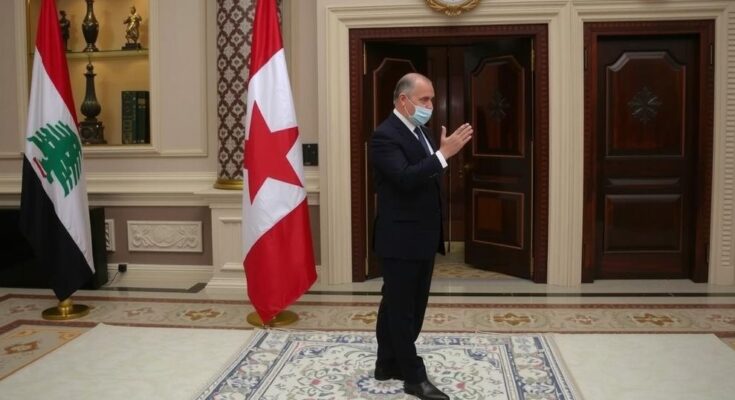Lebanon’s caretaker Prime Minister Najib Mikati visited Syria’s de facto leader Ahmed al-Sharaa, marking the first visit by a Lebanese PM in 15 years. They discussed border security, smuggling issues, and the Syrian refugee situation in Lebanon. Both leaders agreed on forming committees to address these challenges, indicating a potential for stronger bilateral relations following Lebanon’s recent presidential elections.
In a significant diplomatic move, Lebanon’s caretaker Prime Minister Najib Mikati visited Damascus for talks with Syria’s de facto leader Ahmed al-Sharaa, marking the first visit by a Lebanese prime minister to Syria in 15 years. During their meeting, they addressed several bilateral issues, including measures to secure their borders and combat smuggling. Mikati expressed Lebanon’s commitment to collaborating with Syria on delineating both land and maritime borders, emphasizing the importance of preventing smuggling activities that have historically occurred along their extensive border.
Al-Sharaa reiterated the need for long-term strategic relations between Syria and Lebanon, particularly after Lebanon’s recent presidential elections, which he described as essential to fostering stability. Notably, both leaders agreed to establish committees to tackle ongoing challenges, including the significant issue of smuggling, which has involved the trafficking of weapons and drugs from Syria into Lebanon. This alliance is crucial as Lebanon contends with a porous eastern border known for smuggling activities, exacerbating their internal crises.
Additionally, the refugee situation was a focal point of discussion, with al-Sharaa stressing Syria’s intention to find solutions regarding the approximately 1.5 million Syrian refugees residing in Lebanon. The influx of refugees has placed immense strain on Lebanon’s already fragile economy and infrastructure. In light of this, Lebanon’s new president, Joseph Aoun, recently indicated a readiness for serious dialogue with Syria to address these pressing concerns.
Historically, Syria has wielded significant influence over Lebanon, maintaining a military presence for nearly three decades until 2005. However, the relationship has been tumultuous, particularly after the assassination of former Lebanese Prime Minister Rafik Hariri led to Syria’s withdrawal under international pressure. The recent discussions signal a potential thaw in relations, aiming for cooperative support and resolution of shared issues between the two neighboring nations.
Lebanon and Syria share a complex and often contentious relationship, marked by Syria’s historical military and political influence in Lebanon. The Syrian civil war, which began in 2011, significantly affected both nations, resulting in Lebanon hosting approximately 1.5 million Syrian refugees, further complicating its economic and social landscape. The recent election of President Joseph Aoun in Lebanon has offered a unique opportunity to reassess and potentially rebuild bilateral relations, particularly in light of mutual concerns such as border security and economic recovery.
The meeting between Prime Minister Najib Mikati and Ahmed al-Sharaa reflects a pivotal moment in Lebanese-Syrian relations, with both nations expressing a desire for collaboration on pressing border and refugee issues. The establishment of joint committees may pave the way for improved security and economic stability in the region. The historic context of their relationship, coupled with contemporary challenges, underscores the potential for a renewed partnership amidst shared interests.
Original Source: www.aljazeera.com




